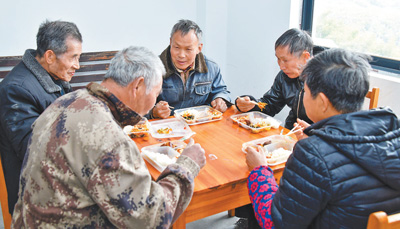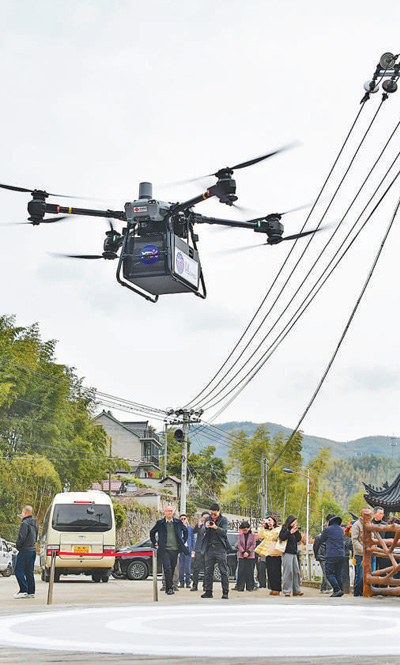Thanks to a drone-assisted meal delivery service, elderly residents in the mountainous areas of a village in east China's Zhejiang Province can now receive warm meals from a canteen for the elderly within minutes.

 Elderly residents enjoy warm lunches delivered by drone from a canteen for the aged, at a senior activity center in a natural village under Fenglian village, Hengcun township, Tonglu county, Hangzhou city, capital of east China's Zhejiang Province. (People's Daily/Huang Qiang)
Elderly residents enjoy warm lunches delivered by drone from a canteen for the aged, at a senior activity center in a natural village under Fenglian village, Hengcun township, Tonglu county, Hangzhou city, capital of east China's Zhejiang Province. (People's Daily/Huang Qiang)
On March 31, 2025, the drones began delivering meals for 168 elderly residents across the five natural villages under Fenglian village, Hengcun township, Tonglu county, Hangzhou city, capital of Zhejiang Province, marking the launch of the trial run of Zhejiang's first drone-assisted meal delivery project for the elderly in mountainous areas.
In Songjia village, one of Fenglian's five natural villages, the delivery time has been slashed from 30 minutes by car to just four minutes by drone.
"Two meat dishes and one vegetarian dish only cost three yuan ($0.41). The canteen is 3 kilometers away, and now the food gets here in just a few minutes. That was unimaginable in the past," said a villager named Song Jinchun.
The drone-assisted service, jointly launched by the government of Hengcun township and Chinese courier enterprise YTO Express, currently uses two drones, each capable of carrying up to 40 kilograms and flying for around 20 minutes.

 A drone delivering lunches to elderly villagers prepares to land in front of a senior activity center in a natural village under Fenglian village, Hengcun township, Tonglu county, Hangzhou city, capital of east China's Zhejiang Province. (People's Daily/Huang Qiang)
A drone delivering lunches to elderly villagers prepares to land in front of a senior activity center in a natural village under Fenglian village, Hengcun township, Tonglu county, Hangzhou city, capital of east China's Zhejiang Province. (People's Daily/Huang Qiang)
Compared with traditional delivery methods, the drones are more than five times as efficient.
Fenglian's five natural villages are scattered across remote, mountainous terrain. The farthest is located about 10 kilometers from the canteen, and a one-way walk along winding mountain roads between the canteen and the village can take more than two hours.
The pilot project aims to address the "last-mile" delivery challenge in rural areas. In the future, the service is expected to expand to include the delivery of express parcels, medicines, and other essential items, in a bid to better leverage technology to benefit people's lives, according to credible sources.


